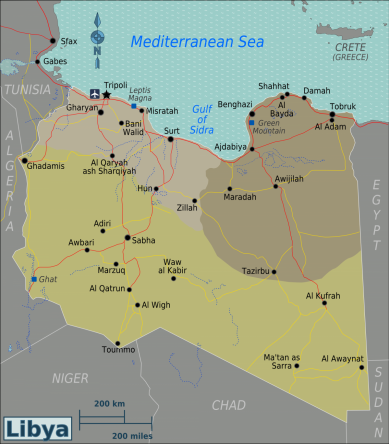Libyan security official 'says' no decision to release held Christians

The head of Libya's Preventive Security has said the release of four Christians detained since February for giving away Christian books and pamphlets in Benghazi is still subject to negotiations.
In a report in the Libya Herald of March 27, the head of the Preventive Security Office, Abdul Salam Barghathi, said he had been misunderstood as saying in an interview that the detainees would be allowed to go back to their home countries.
Barghathi as head of the Preventive Security Office is an intelligence leader in Libya's Ministry of Defense.
The report said Barghathi pointed out the difference between his use of "might" and the news organization's use of "would" saying there could be more changes in the status of the case.
Bloomberg news reported earlier that Libya would free and deport the four Christian detainees to keep the country's diplomatic relations.
The detainees include a South African, an American who also holds Swedish citizenship, an Egyptian and a South Korean.
According to a report by Fox News, the U.S. State Department confirmed that one of the detainees is an American whom officials refused to identify.
U.S. diplomats have been in contact with the American.
Under Libyan law, the detained Christians could face the death penalty on charges of threatening national security.
The Office of Preventive Security seized 55,000 Christian books and pamphlets and a photocopying machine from the quartet.
They gave away some of the confiscated Bibles to children and Libya's poor, Barghathi added. He reiterated that Libya is a 100 percent Muslim country and that the dissemination of Bibles was a threat to their security.
Unrest continues in Libya almost 18 months after the death of former Libyan dictator Muammar Gaddafi.
On March 26, about 200 militiamen and protesters tried to take over the Office of Libyan Prime Minister Ali Zidan in the capital of Tripoli.
Libya is struggling with powerful Islamist militias who are demanding the implementation of strict Sharia, the laws governing Muslims.
Under the Transitional National Council, Libya's parliament is developing the country's constitution. Successive militia attacks have, however, hampered the drafting.
On March 14, Islamists torched an Egyptian Coptic Church in Benghazi following the arrest of 48 Egyptians allegedly spreading Christianity.
One of the 48 Egyptians died while in the custody of the Office of Preventive Security triggering protests in Cairo. The majority of Christians in Benghazi are from Egypt. Benghazi is Libya's second largest city.
The uprising that toppled the government of Gaddafi in February 2011 started in the city.
It was also the former capital of the National Transitional Council.
Benghazi, however, did not take the center stage of the international news until the death of U.S. Ambassador John Christopher Stevens and other three Americans in an attack on September 11, 2012.
In the capital of Tripoli, Christian churches increased security due to fear of Islamist militants attack.
On March 31 during Easter celebration, the usually open doors of the Christ the King Church were closed during services.
The customary Palm Sunday parade through the streets of Tripoli was also canceled. The Vatican also closed the Congregation of the Holy Family of Spoleto in Derna, a coastal city in Eastern Libya.
Despite action against them, Christians continue to cautiously hold worship services.
Prior to the civil war, an estimated 100,000 Christians were stationed in Libya, most of them foreign workers mainly from African countries such as Egypt, India, and the Philippines. The number has been reduced to half since the Libyan war.